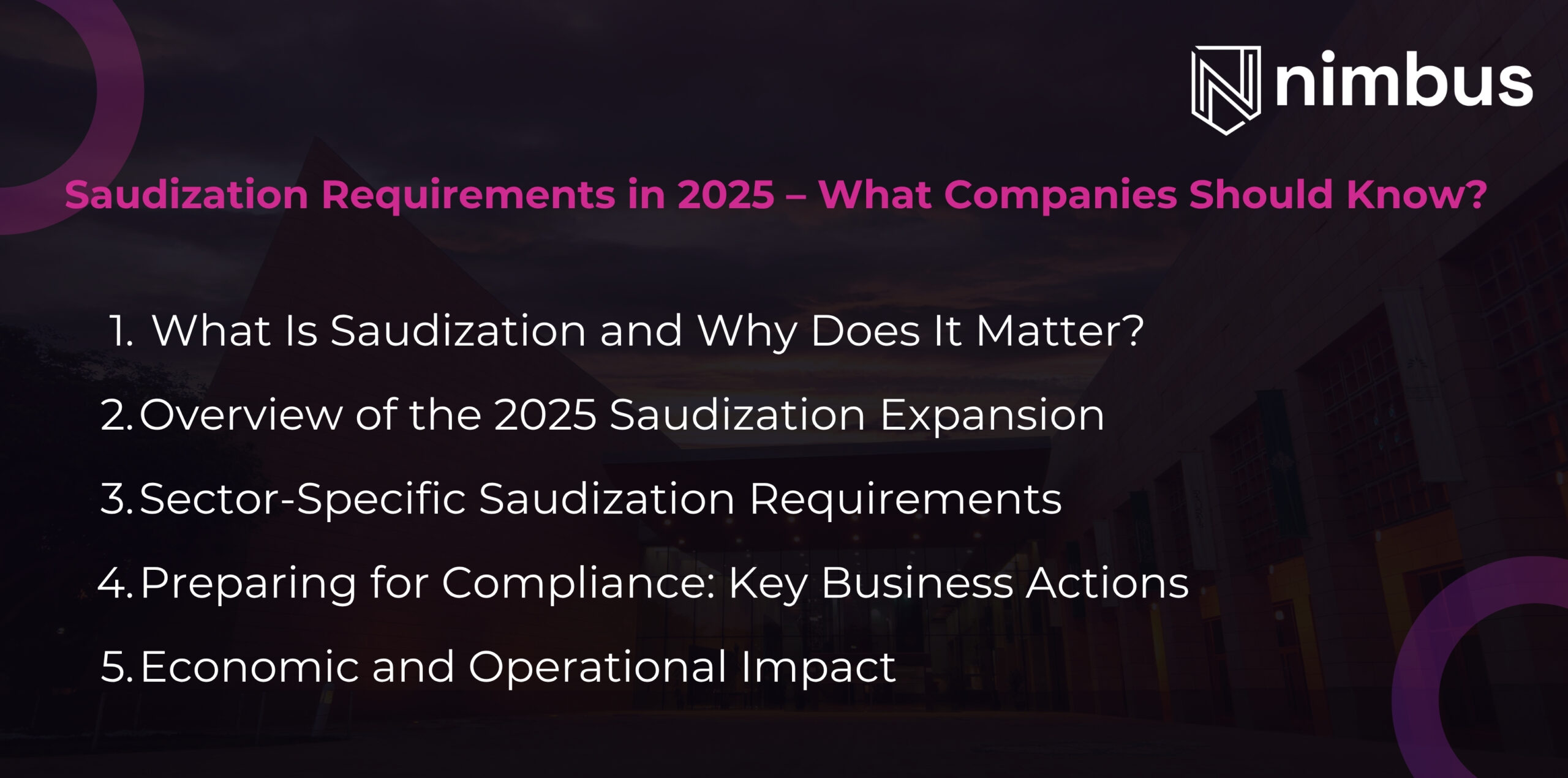In line with Vision 2030, Saudi Arabia continues to intensify its Saudization efforts, formally known as the Nitaqat program, by mandating higher local employment quotas across several key sectors.
The Ministry of Human Resources and Social Development (MHRSD) recently announced a significant expansion of Saudization requirements to be phased in throughout 2025.
These changes will affect 269 professions, with major implications for the private sector, particularly in the fields of healthcare, pharmacy, dentistry, accounting, and engineering. It will also impact business setup services in Saudi Arabia.
This policy shift underscores the Kingdom’s long-term strategy to reduce unemployment, upskill Saudi nationals, and localize critical sectors of the economy.
As a result, businesses operating in Saudi Arabia must begin preparing now to remain compliant, competitive, and aligned with national objectives. Here’s a breakdown of what to expect and how companies can adapt.
Saudization Requirements in 2025 – What Companies Should Know?
1. What Is Saudization and Why Does It Matter?
Saudization, or the Saudi nationalization scheme, is a government policy requiring private sector employers to hire Saudi nationals to fill specific job categories. Since its formalization in 2011 under the Nitaqat system, the policy has evolved to include sector-specific requirements and salary thresholds.
Saudization plays a central role in the government’s Vision 2030 reform plan, which seeks to create a more self-sufficient and diversified economy by boosting local workforce participation.
For businesses, understanding and complying with Saudization is a legal obligation. Failure to meet Saudization targets can result in fines, downgraded company ratings, restricted government services, or even the suspension of operations.
2. Overview of the 2025 Saudization Expansion
Starting mid-2025, new Saudization requirements will be implemented across a wide range of professional roles. These regulations are being rolled out in partnership with other regulatory bodies, including the Ministry of Health, Ministry of Commerce, and Ministry of Municipalities and Housing.
The focus is clear: drive more employment opportunities for Saudi nationals in high-demand, skilled professions.
3. Sector-Specific Saudization Requirements
– Pharmacy and Dentistry Professions
- Effective Date: July 27, 2025
- Pharmacy-related roles:
- Pharmacies in general: 55 percent Saudization
- Pharmacy services in hospitals: 65 percent Saudization
- Community pharmacies and medical complexes: minimum 35 percent Saudization
- Applies to establishments with five or more workers in pharmacy professions
- Employers must meet a minimum salary threshold of SAR 9,000 (about USD 2,400) per Saudi dentist Dentistry roles:
- Phase 1 (2025): 45 percent Saudization
- Phase 2 (2026): 55 percent Saudization
- Applies to establishments with three or more dentists
- Employers must meet a minimum salary threshold of SAR 9,000 (about USD 2,400) per Saudi dentist Dentistry roles:
– Healthcare Professions
The following four major healthcare fields will see increased localization:
- Medical laboratories: 70 percent (up from 60 percent)
- Physiotherapy: 80 percent (up from 60 percent)
- Radiology: 65 percent (up from 60 percent)
- Therapeutic nutrition: 80 percent (up from 60 percent)
Implementation Timeline:
- April 17, 2025: Applies to all hospitals and large health facilities in Riyadh, Jeddah, Makkah, Madinah, Dammam, and Al Khobar
- October 17, 2025: Applies to all remaining hospitals and health facilities across the Kingdom
The healthcare industry must prepare for a significant internal shift, both in talent acquisition and workforce structuring. Government support in the form of recruitment assistance and training subsidies will be made available to help companies transition smoothly.
– Accounting Professions
- Start Date: October 27, 2025
- Initial Requirement: 40 percent Saudization
- Future Increase: Up to 70 percent over five years
- Applicability: Companies with five or more accountants
This phased approach gives businesses time to recruit and train Saudi accountants while aligning HR policies with long-term staffing goals.
– Engineering Professions
- Start Date: July 27, 2025
- Requirement: Minimum 30 percent Saudization
- Applicability: Private-sector companies with five or more engineers
Technical engineering roles are a key target of Saudization in 2025, marking a shift toward localizing specialized and high-skill professions that are central to infrastructure and development projects.
4. Preparing for Compliance: Key Business Actions
The new Saudization requirements present both a challenge and an opportunity for companies operating in Saudi Arabia. Employers need to act early and strategically to align their operations with the new labor mandates. Here are some recommended steps.
- Conduct workforce audits: Identify roles impacted by Saudization and evaluate your current national vs. expatriate employee ratios in those areas.
- Update hiring plans: Prioritize the recruitment of Saudi nationals for affected positions and begin building a pipeline of qualified candidates in advance of deadlines.
- Engage with government programs: Leverage available training and recruitment support services from MHRSD and other entities.
- Budget for salary thresholds: Ensure payroll planning accommodates any required minimum salaries for Saudi hires, such as the SAR 9,000 requirement for dentists.
- Train and upskill: Invest in internal training programs to help new Saudi hires meet performance expectations and integrate into the workplace.
- Review compliance checklists: Stay current with official procedural guidelines and submit required documentation on time to avoid penalties.
5. Economic and Operational Impact
The goal behind the 2025 Saudization policies is to encourage a more balanced and resilient labor market. While compliance may require upfront adjustments, especially for companies heavily reliant on expatriate labor, the long-term benefits include:
- Access to government incentives for compliant firms
- Enhanced company reputation and trust with local stakeholders
- Reduced reliance on costly and uncertain foreign labor pipelines
- Contribution to national development objectives under Vision 2030
By investing in local talent and fostering an inclusive employment culture, companies can future-proof their operations while playing a role in Saudi Arabia’s socio-economic transformation.
– The Road Ahead
Saudi Arabia’s new Saudization measures mark a pivotal step in labor market reform. While the 2025 deadlines for a couple of sectors may seem distant, the time to act is now, especially for investors seeking company formation services in Saudi Arabia.
Companies that begin planning early will have a competitive edge in recruitment, training, and compliance. Those that delay risk reputational and operational setbacks.
As the regulatory landscape evolves, it’s essential for businesses to remain proactive, informed, and responsive. If your business needs help navigating Saudization compliance and its impact on business setup in the KSA, consider seeking expert guidance to ensure a smooth transition.




